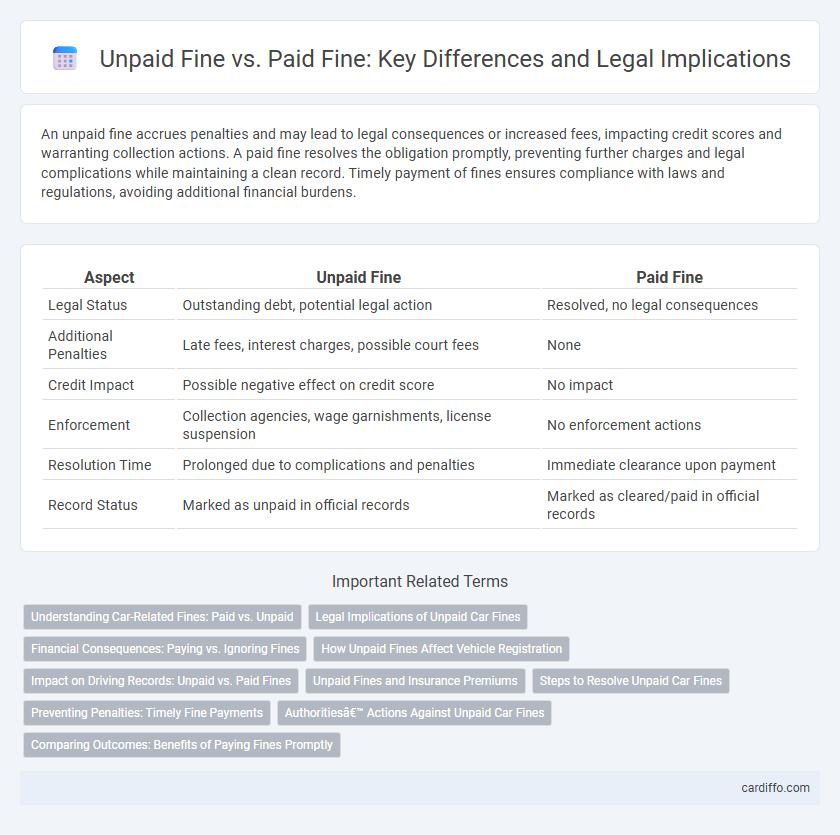An unpaid fine accrues penalties and may lead to legal consequences or increased fees, impacting credit scores and warranting collection actions. A paid fine resolves the obligation promptly, preventing further charges and legal complications while maintaining a clean record. Timely payment of fines ensures compliance with laws and regulations, avoiding additional financial burdens.
Table of Comparison
| Aspect | Unpaid Fine | Paid Fine |
|---|---|---|
| Legal Status | Outstanding debt, potential legal action | Resolved, no legal consequences |
| Additional Penalties | Late fees, interest charges, possible court fees | None |
| Credit Impact | Possible negative effect on credit score | No impact |
| Enforcement | Collection agencies, wage garnishments, license suspension | No enforcement actions |
| Resolution Time | Prolonged due to complications and penalties | Immediate clearance upon payment |
| Record Status | Marked as unpaid in official records | Marked as cleared/paid in official records |
Understanding Car-Related Fines: Paid vs. Unpaid
Understanding car-related fines involves recognizing that unpaid fines accumulate penalties, increase the total amount owed, and may lead to legal consequences such as vehicle registration suspension or driver's license revocation. Paid fines, on the other hand, resolve the violation promptly, prevent additional fees, and maintain driving privileges. Timely payment of traffic tickets ensures compliance with traffic laws and avoids escalating financial and legal repercussions.
Legal Implications of Unpaid Car Fines
Unpaid car fines can lead to serious legal consequences, including increased penalties, license suspension, and potential court appearances. Authorities may issue warrants or place holds on vehicle registration, hindering the ability to legally drive or sell the vehicle. Failure to settle fines promptly often results in a growing financial burden and a negative impact on credit scores.
Financial Consequences: Paying vs. Ignoring Fines
Paying fines promptly avoids escalating financial penalties, including late fees and interest charges that accumulate over time. Ignoring unpaid fines can lead to increased debts, legal actions, or even wage garnishment, significantly impacting personal finances. Timely payment ensures cost control and prevents long-term financial burdens associated with unresolved fines.
How Unpaid Fines Affect Vehicle Registration
Unpaid fines can directly impact vehicle registration by causing delays or preventing renewal until outstanding balances are settled. Authorities typically place holds on registration records, requiring payment of all fines before processing new registrations or renewals. Persistent non-payment may lead to additional penalties, suspension of vehicle registration, or legal actions.
Impact on Driving Records: Unpaid vs. Paid Fines
Unpaid fines significantly damage driving records by accumulating points and potentially leading to license suspension or revocation. Paid fines help maintain a cleaner driving record, preventing penalties from escalating and reducing insurance premium increases. Courts often report unpaid fines to motor vehicle departments, intensifying negative consequences compared to promptly paid fines.
Unpaid Fines and Insurance Premiums
Unpaid fines can lead to increased insurance premiums as insurers view unresolved penalties as indicators of higher risk behavior. Insurance companies often access driving records, where unpaid fines negatively impact risk assessments and result in elevated premium costs. Timely payment of fines helps maintain a clean driving history and prevents unnecessary increases in insurance expenses.
Steps to Resolve Unpaid Car Fines
Unpaid car fines accumulate penalties and may lead to vehicle registration suspension or legal actions, while paid fines clear your record and avoid additional charges. To resolve unpaid car fines, first verify the outstanding amount through your local traffic authority's online portal, then arrange payment either online, by mail, or in person. Ensuring timely payment prevents escalation of fines, maintains a clean driving record, and restores full vehicle registration privileges.
Preventing Penalties: Timely Fine Payments
Timely fine payments prevent additional penalties and legal complications, ensuring compliance with regulatory requirements. Unpaid fines can lead to increased fees, collection actions, and potential impacts on credit scores. Maintaining prompt payments safeguards financial standing and avoids unnecessary enforcement measures.
Authorities’ Actions Against Unpaid Car Fines
Authorities impose strict enforcement measures against unpaid car fines, including vehicle immobilization, license suspension, and increased penalty fees. Failure to pay fines promptly can result in legal actions such as court summons or vehicle impoundment. Persistent non-payment often triggers credit score impacts and hampers vehicle registration renewals, emphasizing the importance of timely fine settlement.
Comparing Outcomes: Benefits of Paying Fines Promptly
Paying fines promptly prevents additional penalties such as late fees, increased interest, or potential legal action, which often escalate costs significantly over time. Unpaid fines can lead to negative credit reports, license suspensions, and even warrants, severely impacting financial and personal stability. Timely payment enhances financial health by avoiding these consequences, promoting compliance, and maintaining a clean legal record.
Unpaid fine vs paid fine Infographic

 cardiffo.com
cardiffo.com